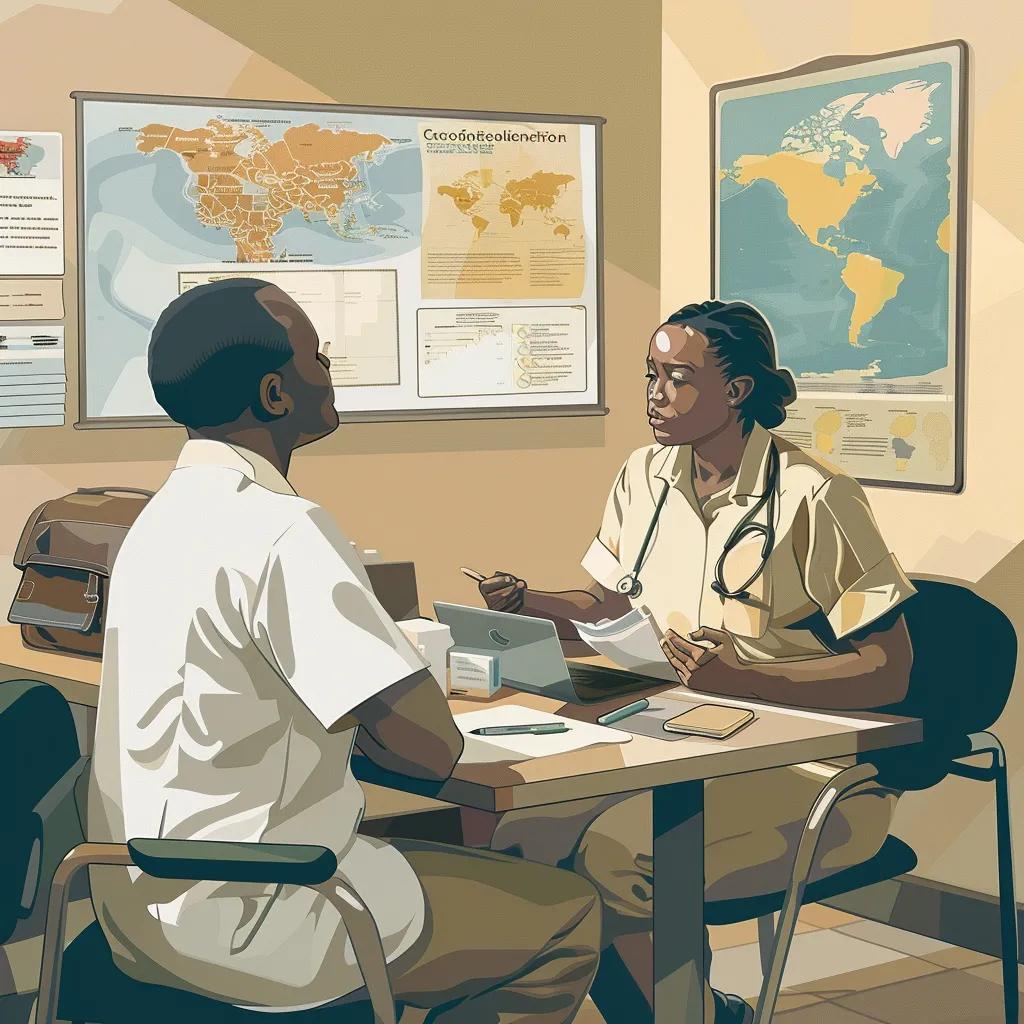Kenya and Tanzania Safari Travel: Charting Your Course for an Unforgettable Adventure
Are you pondering the choice between exploring Kenya’s expansive savannas or Tanzania’s legendary wildlife sanctuaries for your next safari expedition? Deciding between these two East African giants involves a careful consideration of wildlife abundance, seasonal patterns, budget, and, crucially, your health preparedness. This guide will illuminate the distinct differences and shared experiences of these safari powerhouses, detail essential vaccination requirements, provide tailored health checklists, and share expert strategies to ensure your well-being throughout your East African journey. We’ll delve into the unique characteristics of their national parks and crowd dynamics, outline specific vaccine recommendations for each nation, present effective malaria prevention tactics, and demonstrate how Travelbug Health’s personalized consultations empower you to embark on your safari with complete peace of mind.
What Sets Kenyan and Tanzanian Safaris Apart?
While both Kenya and Tanzania offer unparalleled wildlife viewing opportunities, they diverge in their park landscapes, visitor density, pricing structures, and overall safety considerations. Understanding these nuances is key to aligning your ideal safari experience with the perfect destination and planning your health measures accordingly.
Which Wildlife and National Parks Are Distinct to Kenya and Tanzania?
Kenya’s renowned Maasai Mara and Amboseli offer a different experience than Tanzania’s iconic Serengeti and Ngorongoro Crater, each boasting unique concentrations of species and distinct habitat types.
Kenya’s parks present a varied tapestry of savanna and mountainous ecosystems, while Tanzania’s reserves encompass vast plains and the dramatic highland rim of the Ngorongoro Crater. These geographical differences can influence the specific health precautions you might need, such as enhanced insect protection or measures for altitude acclimatization.
How Do Safari Seasons and Visitor Crowds Compare Between Kenya and Tanzania?
Kenya experiences its short rains from October to December and long rains from March to May, offering lush landscapes but potentially fewer game drive opportunities. In contrast, Tanzania’s dry season, from June to October, aligns perfectly with the spectacular Great Migration in the Serengeti.
- June–October: Prime time for witnessing the Great Migration in Tanzania, with higher visitor numbers.
- January–March: The calving season in Kenya’s Maasai Mara, typically with moderate crowds.
- March–May: Lower prices are often available in both countries, though this period also sees heavier rainfall.
The timing of your visit can significantly impact mosquito activity and the availability of services, guiding your choice of antimalarial medication and essential packing items.
What Are the Financial Differences Between Kenyan and Tanzanian Safari Packages?
Kenya generally provides a broader spectrum of pricing, from rustic mobile camps to opulent lodges. Tanzania, particularly during peak season in the Serengeti, often commands higher, premium rates.
Understanding the daily cost can help you budget for potential health-related rest days or contingency plans within your itinerary.
How Do Safety and Political Stability Compare for Safari-Goers?
Both Kenya and Tanzania maintain secure safari corridors with minimal political instability in their primary wildlife reserves. While Kenya may experience occasional urban protests, these rarely affect remote park areas. Tanzania’s tourist zones consistently remain peaceful. Standard travel precautions, such as avoiding city travel after dark and adhering to your guide’s instructions, are generally sufficient for most visitors.
What Are the Essential Health Preparations for Your Kenyan or Tanzanian Safari?

Essential health preparations encompass mandatory and recommended vaccinations, appropriate malaria prophylaxis, and diligent preventive measures against diseases transmitted by food and water or insects. Fulfilling these requirements not only safeguards your health but also ensures compliance with entry regulations.
Vaccination Guidance for International Travelers
For travelers venturing to East Africa, it is highly advisable to consider vaccinations against diseases such as Hepatitis A and B, Typhoid, and Rabies, as these are commonly recommended for the region. These immunizations offer crucial protection against illnesses contracted through food, water, or blood, as well as potential exposure to rabies from animals.
This authoritative source provides a comprehensive overview of recommended vaccinations for international travel, directly relevant to the health requirements for safaris in Kenya and Tanzania.
Meeting these health prerequisites involves understanding the prevalent diseases in the region and consulting with a travel medicine specialist well in advance of your departure.
Is the Yellow Fever Vaccine a Requirement for Safari Travelers Entering Kenya and Tanzania?
Indeed, a valid Yellow Fever vaccination certificate is mandatory for entry into Tanzania if you have recently traveled through Kenya or any other country where yellow fever is endemic. While Kenya does not typically require proof of vaccination for travelers arriving directly from non-endemic regions, vaccination is strongly advised. Ensuring your certificate is valid at least 10 days prior to your travel date will help prevent entry delays and protect you from yellow fever transmission.
What Vaccinations Are Recommended for a West African Safari Adventure?
The following vaccines are usually recommended for travel to both Kenya and Tanzania, depending on your own medical and vaccine history and planned itinerary:
- Hepatitis A: To guard against transmission via contaminated food or water.
- Typhoid: For protection against typhoid fever, a serious food and waterborne illness.
- Hepatitis B: To prevent infection from exposure through blood or bodily fluids. The incidence of hepatitis B is extremely high throughout Africa.
- Rabies: To mitigate the risk of animal bites and contacts.
- Polio Booster: May be recommended in areas where polio remains prevalent.
- MMR & Tdap: To ensure routine immunizations for these extremely contagious diseases are up-to-date.
- COVID-19 and influenza: Still the two most common vaccine-preventable diseases encountered around the world.
Consult with your travel health specialist to determine which vaccines are right for you. Completing these vaccinations 4-6 weeks before your departure allows your body to build optimal antibody levels for your safari.
Malaria Risks and Prevention Strategies For Travel to Kenya and Tanzania.

Effective Malaria Prevention Strategies
Malaria is endemic throughout most of Kenya and almost all of Tanzania. Your risk of acquiring malaria depends on the season, the local habitat as well as your activities and itinerary. Preventing malaria in East Africa involves a multi-pronged approach, combining antimalarial medication with diligent use of insect repellent and insecticide-treated bed nets and clothes. Be sure to consult with a travel health specialist prior to your trip who can advise you on the different choices of malaria prevention medication based on your risk and medical history.
This citation reinforces the article’s guidance on malaria risks and prevention, emphasizing the necessity of a comprehensive strategy for traveler protection.
How Can You Best Prepare for Safari Health Hazards in East Africa?
Preparing for safari health involves meticulous planning: confirming your vaccination status, assembling a well-stocked medical kit, and adopting vigilant environmental precautions. Proactive readiness is key to minimizing potential illness disruptions and ensuring you are prepared for any unforeseen health events.
What Should Be Included in a Comprehensive Pre-Safari Health Checklist?
- A thorough review of your personal immunization history and any necessary immunizations.
- Prescription for antimalarial medication tailored to your specific itinerary.
- Procurement of effective insect repellent (containing DEET or picaridin) and permethrin spray for clothing.
- Comprehensive travel insurance that includes emergency medical evacuation coverage.
- Copies of all essential health documents and contact information for local medical facilities.
Completing this checklist well in advance ensures you have ample time to address any health gaps or specific medical needs before your departure.
How to Assemble an Effective Travel Medical Kit for Your Kenyan or Tanzanian Safari?
- Personal prescription medications and antimalarial pills, kept in their original labeled containers.
- Antibiotics prescribed by your provider to manage traveler’s diarrhea.
- Antihistamines and an epinephrine auto-injector if needed for treating allergic reactions.
- Essential wound-care supplies: bandages, antiseptic wipes, and topical antibiotic cream.
- Oral rehydration salts and medication to alleviate nausea.
Keeping this kit readily accessible in your carry-on luggage guarantees immediate access to necessary medical supplies should any health incidents occur in remote areas.
What Are the Most Effective Insect Bite Prevention Methods for Safari Travelers?
- Wear long-sleeved shirts and trousers made of light-colored fabric, ideally treated with permethrin.
- Apply a long acting DEET or picaridin based repellent to all exposed skin as directed.
- Sleep under an insecticide-treated bed net, especially in semi-open lodges or accommodations.
By combining physical barriers with effective topical repellents, you can reduce mosquito exposure by over 90%, significantly lowering your risk of contracting malaria, dengue fever and other insect-borne diseases.
How Can You Ensure Food and Water Safety During Your Safari?
- Consistently drink only bottled or properly treated drinking water.
- Avoid consuming ice cubes and unpasteurized dairy products.
- Choose meals that are thoroughly cooked and served piping hot.
- Consider a water purification device as a backup.
Adhering to safe consumption practices is vital for preventing traveler’s diarrhea and waterborne infections, ensuring you remain healthy and active throughout your daily game drives.
What Are the Specific Health Considerations for Kenyan Safari Travelers?
Kenya’s diverse geography, ranging from coastal lowlands to highland forests, presents unique health challenges that necessitate tailored vaccination choices and preventive measures.
How Does Malaria Risk Vary Across Different Regions of Kenya?
Malaria transmission remains high in Kenya’s coastal and western lowland areas, such as Tsavo and the Lake Victoria regions. However, the risk diminishes at higher altitudes in the central highlands, including areas around Nairobi. Travelers should maintain full antimalarial prophylaxis in lowland reserves and continue insect-avoidance tactics even in areas with moderate risk.
What Other Diseases Should Kenyan Safari Travelers Be Aware Of?
- Typhoid: Transmitted through contaminated food or water.
- Rabies: A risk from stray animals or wildlife encounters.
- Hepatitis A/B: Contracted through contaminated food or exposure to infected blood and blood products.
- Dengue Fever: Primarily found in coastal urban fringe areas.
- Meningitis: a highly contagious and dangerous disease that is prevalent from December through June.
Understanding these potential threats will help guide your vaccine selection and on-site precautions.
How Accessible Are Medical Facilities During a Kenyan Safari?
While major parks may offer basic first-aid stations, comprehensive medical care is readily available in Nairobi and Mombasa through well-equipped referral hospitals. Specialized private evacuation services, such as Flying Doctors, are available to bridge gaps in remote areas, facilitating rapid transfer to advanced medical facilities when necessary. Travelers should always be protected with comprehensive medical and evacuation insurance.
What Are the Specific Health Considerations for Tanzanian Safari Travelers?
Tanzania’s vast plains and unique crater-highland ecosystems require carefully considered health strategies, from appropriate malaria prophylaxis to precautions against schistosomiasis when near freshwater lakes.
How Does Malaria Risk Vary Across Different Regions of Tanzania?
Areas like the Serengeti and the coastal regions experience high rates of malaria transmission. In contrast, the Ngorongoro Crater, situated at an elevation of 2,200 meters, has significantly reduced mosquito activity. Your choice of antimalarial prophylaxis should be informed by the altitude of your destinations and your personal tolerance for potential side effects.
What Other Diseases Are Common in Tanzanian Safari Areas?
- Bilharzia (Schistosomiasis): Transmitted through contact with contaminated freshwater.
- Dengue Fever: Outbreaks can occur in coastal towns.
- Polio: Resurgence necessitates updated booster doses for travelers.
- Traveler’s Diarrhea: Commonly contracted from local food and water sources.
Maintaining strict hygiene standards and limiting contact with lake or river water can effectively mitigate these risks.
What Is the Availability of Medical Facilities in Tanzanian Safari Regions?
Arusha and Dar es Salaam are home to well-equipped private hospitals. However, clinics located within the northern circuit parks typically offer only basic emergency medical care. Medical air services provide evacuation options, underscoring the importance of securing robust travel insurance.
Why Partner with Travelbug Health for Your Safari Health Preparations?
Travelbug Health excels in providing specialized travel medicine services, combining expert medical knowledge, personalized planning, and streamlined appointment management to ensure you meet all health requirements before embarking on your East African safari.
How Does Travelbug Health Offer Tailored Vaccine and Health Consultations?
Travelbug Health’s certified clinicians meticulously review your travel itinerary, personal medical history, and potential risk exposures. This allows them to craft a customized vaccination schedule, antimalarial regimen, and preventive health advice specifically for your journey to Kenya and Tanzania. This individualized approach prevents unnecessary vaccinations and ensures no critical protection is overlooked.
What Travel Health Services Does Travelbug Health Provide for Kenyan and Tanzanian Safaris?
Our comprehensive suite of services includes:
- Comprehensive pre-travel medical and health risk assessments.
- Administration of all required and recommended vaccines.
- Dispensing or prescribing of antimalarial medications with clear dosing instructions.
- Personalized pre-travel health reports and essential packing checklists.
- Support for post-travel symptom monitoring.
By integrating these services, we provide you with the utmost confidence in your health readiness and ensure access to expert follow-up care.
How to Schedule Your Pre-Safari Health Consultation with Travelbug Health?
To secure your personalized safari health plan, please visit our “Contact Our Travel Clinic – TravelBug Health” page and book your appointment at least six weeks prior to your departure date. Early scheduling guarantees timely vaccinations and thorough preparation for your Kenyan and Tanzanian adventure.
What Are the Most Frequently Asked Questions About Kenyan and Tanzanian Safari Health?
Safari travelers commonly inquire about mandatory vaccinations, the necessity of antimalarial medication, and overall destination safety. Addressing these questions upfront helps you plan and fully enjoy a healthy and seamless adventure.
Is Yellow Fever Vaccination Mandatory for Travelers Moving Between Kenya and Tanzania?
Yes, Tanzania mandates a valid Yellow Fever certificate for entry if you are traveling from Kenya or any other country where the disease is endemic. Kenya does not typically require proof for direct arrivals from non-endemic regions, although vaccination is always a prudent measure.
Do I Need Malaria Pills for a Safari in Kenya or Tanzania?
Absolutely. Both Kenya and Tanzania present malaria risks, particularly in lowland game reserves. Taking a CDC-recommended prophylactic medication—such as atovaquone-proguanil, doxycycline, or mefloquine—in conjunction with insect repellent and bed nets is crucial for your protection.
What Vaccinations Should I Obtain Before an East African Safari?
Essential immunizations include Yellow Fever (if required for entry), Typhoid, Hepatitis A/B, Rabies (especially for high-risk activities and remote locations), a Polio booster if appropriate, and current routine immunizations including MMR, Tdap, COVID-19 and the flu. Beginning your vaccination process four to six weeks before travel maximizes the efficacy of the vaccines.
How Can I Monitor My Health After Returning From a Safari?
It’s important to monitor for any post-travel symptoms by taking your temperature daily for two weeks. Watch for signs of fever, rash, or gastrointestinal distress, and consult Travelbug Health immediately if you experience any illness. Early testing for malaria or other infections ensures prompt and effective treatment.
Embarking on a safari in Kenya or Tanzania promises an unparalleled opportunity to witness incredible wildlife. By diligently following these health guidelines, you can significantly minimize risks and fully immerse yourself in the adventure. Begin your preparations with expert consultations from Travelbug Health and experience the wonders of East Africa with confidence and complete peace of mind.


